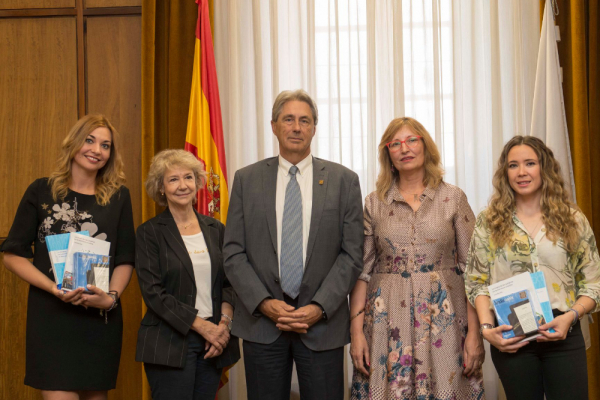'Clarity and briefness are the qualities that I highlight most in a communicator'
Julia Barella she is the director of the School of Writing of Universidad de Alcalá, created in 2006, which offers face-to-face and online workshops on creative writing, linguistic correction and writing, thus encouraging the good use of the language. In addition, from the School any doubt that arises with language is resolved: lexicon, spelling, etc.
- Who can access the School's writing workshops?
Our courses are open to the entire university community: Students, POIs and PAS. Also, UAH Alumni and all people interested in the topics offered can access, even if they are not linked to Universidad de Alcalá. Not only do we have students from the UAH, also from other Spanish and Latin American universities, and other nationalities.
- Which profile of the university community demands them the most?
Courses related to academic writing or linguistic correction have more demand among students who will soon perform their End of Degree Work, Master's Degree Work or thesis. Precisely, this four-month period, we have given a course in collaboration with the Doctorate School aimed at writing theses.
With regard to creative writing courses, the profile of participants is more diverse, but everyone has in common the taste for literature and the objective of developing their creativity, especially in the field of narrative.
- Due to the current pandemic situation, many researchers and scientists have appeared in the media providing information on this issue. In general, what are the difficulties these profiles have in communicating and/or writing non-scientific texts?
Most of our scientists, researchers and professors who specialize in this or which subject matter often communicate their findings in congresses, meetings, seminars or classes, in general, to an audience already initiated in their field. There are several difficulties encountered in transmitting information to a non-expert public.
However, we must not forget that the aim is always for information to reach those listeners or readers, whether it be at an international congress or on radio, press, television, etc. These days, many of us doubt that this objective is a priority, for example, in many politicians. The language of politicians has its own rules and this issue would lead us through other twists and turns that do not come to the case.
The most important difficulty for all of us is to find understandable language, far from technicalities, of the periphrases, ambiguities and circumlocutions. I remember, to put an example, in I do not know what reform of education, that a group of pedagogues decided to call the recreation ‘leisure segment’, causing the laughing of all. In short, our efforts should be directed to make the message as clear and as short or concise as possible.
Clarity and brevity are the qualities that I highlight most in a communicator. Perhaps, there are too many researchers among us who are very difficult to get out of their technicalities, for fear of being inaccurate, but our language (Castillian spanish) is very rich, also in synonyms, so I insist that the aim is to understand us, not to show our skills as speakers, our knowledge of scientific terminology and our ability to adorn speech.
- What techniques or workshops do you recommend to improve these difficulties?
In our courses, we often share a phrase attributed to Albert Einstein ‘you really don't understand something unless you are able to explain it to your grandmother’. With this, we would like to emphasize, first of all, the need to keep in mind the characteristics of our target audience and, secondly, how we can adapt our message to this.
ased on this purpose, in our workshops we teach the right tools for the person to know and recognize the many resources our language has; we try to give written and oral tools that facilitate the transmission to others of our thoughts, feelings or findings in this or which field.
We take this into account in some of the last courses we have developed, such as 'Techniques for writing and correcting your texts in the professional and academic field', with Francisco Rodríguez and Pilar Valero; In the workshop 'How to communicate in public results of research and academic work', with José Miguel A. Jáuregui, or the online course 'Strategies for improving your writing', with Zaida Núñez.
- On the website of the School of Writing there is a section for sending linguistic doubts, what are the most common doubts? and the most curious?
We receive questions of all kinds. The most common ones are usually related to spelling, spelling, or syntax, but there are also doubts about lexicon or etymology. In particular, we have many questions about the use of comma and semicolon, or inclusive language.
Among the last ones we have received is the difference between 'attitude' or 'aptitude', whether it is correct to write 'The Bourbon' or 'the Bourbons' or how the acronyms are written. As you can see, there is a lot of variety. These questions then inspire us to create questionnaires or explanatory images that we publish on our social networks.
Among the curious consultations that have arrived, I remember the one we received from a funeral company, in which they asked us to justify to some clients the changes they had made to the writing of an epitaph and a cutlet; it seems that relatives defended another text in which they saw misspellings; and they were right.
- Finally, could you tell us any funny anecdotes that happened because of a linguistic error in the UAH?
It can be fun when you send us a question explaining that it has led to a family discussion and asking us to tell you who is right. It is also very funny to see our students face when they discover some of the latest recommendations of the Royal Academy of the Spanish Language (RAE), for example, not to use 'solo' or 'script'. Some become angry or create very passionate debates.
Publicado en: Inglés
